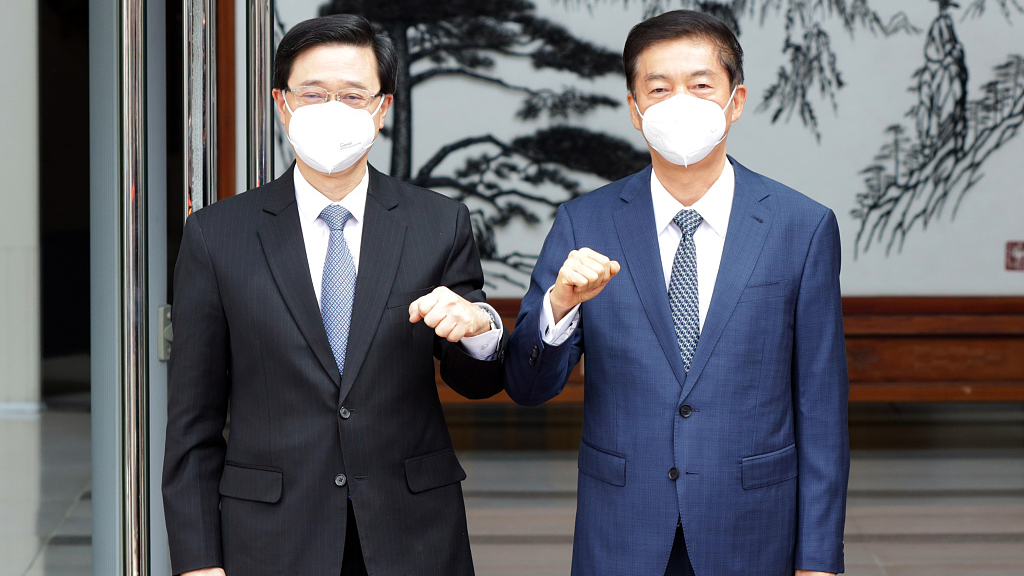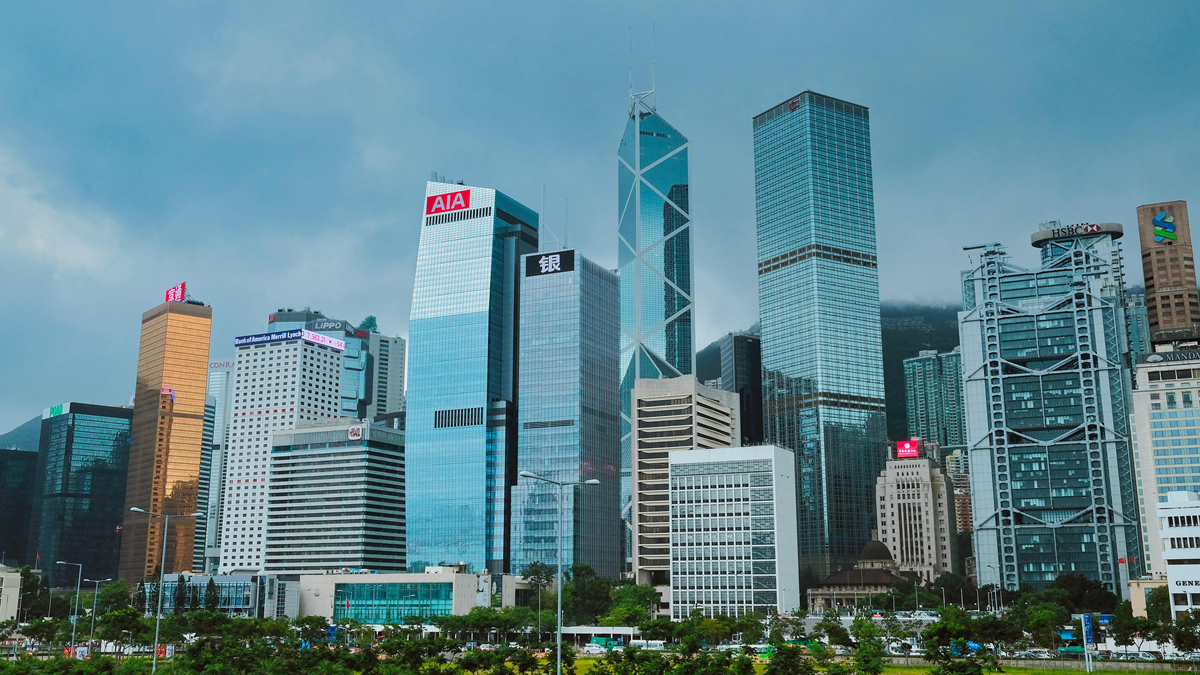
John Lee Ka-chiu (L), who was elected as the sixth chief executive designate of the Hong Kong Special Administrative Region, visits the liaison office of the central government in Hong Kong, China, May 9, 2022. /CFP
John Lee Ka-chiu (L), who was elected as the sixth chief executive designate of the Hong Kong Special Administrative Region, visits the liaison office of the central government in Hong Kong, China, May 9, 2022. /CFP
Editor's note: Grenville Cross is a senior counsel and professor of law, and was previously the director of public prosecutions of the Hong Kong Special Administrative Region. The article reflects the author's opinions and not necessarily the views of CGTN.
On July l5, 2021, the director of the State Council's Hong Kong and Macao Affairs Office, Xia Baolong, described the qualities required of the Hong Kong Special Administrative Region's (SAR) leaders. They had to be "firm patriots," resolutely safeguarding national security, able to think strategically and resolve problems through practical means. A responsible work ethic was also necessary, as was an ability to unite the community.
With this in mind, the Election Committee, on May 8, selected John Lee Ka-chiu, who secured 99.16 percent of the ballots cast, as Hong Kong's sixth-term chief executive designate. Although the Central Government has yet to appoint him, the voters clearly considered Lee has what it takes to lead Hong Kong, for obvious reasons. His background in law and order points to personal integrity and fixity of purpose, and, as a new broom, he can make good on the Basic Law's goal of "long-term stability and prosperity" for Hong Kong.
When I was the director of public prosecutions, Lee, as the director of crime and security, was, for several years, my police counterpart, and we worked closely together, notably on anti-crime strategies. He was always very professional, capable of seeing the wider picture, and easy to work with. When necessary, he could be steely, but he was also personable, and receptive to new ideas. He invariably got the best out of his subordinates, a quality that will stand him in good stead.
If appointed, Lee will be the first to acknowledge that there are policy areas, such as high finance, public health and social welfare, of which he knows little, and he therefore sees himself as a team leader. In some ways an outsider, he calls himself "a practical person," determined to provide "results-oriented" leadership, which sounds encouraging. However, all Lee's predecessors started with lofty declarations and the proof of the pudding lies in the eating.
In practical terms, Lee recognizes not only the importance of addressing domestic issues, but also of maintaining the city's status as an international, and competitive, financial center. He will, therefore, have to decide very soon how best to reopen the border with the Chinese mainland, as well as with the wider world, as connectivity is vital. As he is held in high regard elsewhere in China, Lee's views will be carefully listened to, and he is also well placed to facilitate Hong Kong's greater integration with the Chinese mainland, not least by resolving teething difficulties in the Guangdong-Hong Kong-Macao Greater Bay Area.

A view of Hong Kong. /CFP
A view of Hong Kong. /CFP
To succeed, however, Lee must assemble a ministry of all the talents, comprising people who can bring fresh ideas to the table. If he is to deliver on his vision of building a vibrant metropolis over the next five years, he will need big thinkers around him, willing to think outside the box. He says he intends "to effect changes on government philosophy, and ways of doing things, so as to enhance the effectiveness of policy implementation," and this is just what the doctor ordered. Although he wants to improve civil service culture and procedures, this, after years of institutionalized negativity, may not be easy.
If Lee, who will have a pragmatic leadership style, can master the bureaucracy and get things moving again, significant progress is possible, even in the short term. His agenda is clear, and he intends to strengthen government capability, streamline procedures, improve housing and advance people's livelihoods, and he must stick to his guns. He also plans to enhance competitiveness, pursue sustainable development, build a caring society and enhance social mobility for young people, and, to deliver, he must pull out all the stops. Although there are problems aplenty, ranging from social divisions, pandemic fluctuations to foreign machinations, his background shows he can withstand pressure, and remain focused on the tasks in hand.
As Lee knows well, Hong Kong, 25 years after reunification, has yet to discharge its Basic Law obligation to protect national security (Art.23), and this caused huge problems during the insurrection in 2019-20. Although the National Security Law for Hong Kong (2020) has provided significant protections, much still needs to be done, particularly regarding sedition, treason and theft of state secrets. His assurance, therefore, that he will prioritize this unfinished business will be welcomed throughout China.
Like all new leaders, Lee, upon taking office, will enjoy a honeymoon period, but expectations will be high. His vision of a better Hong Kong is shared by many, and his message of hope resonates widely. Having hit the ground running, he will need to maintain the momentum, and do whatever is necessary to fulfill his objectives. It will not be easy, but everybody who loves Hong Kong will wish him well.
(If you want to contribute and have specific expertise, please contact us at opinions@cgtn.com. Follow @thouse_opinions on Twitter to discover the latest commentaries in the CGTN Opinion Section.)

